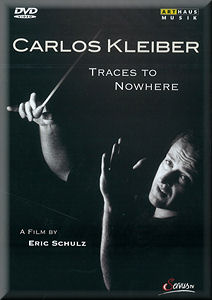 |
 |
|


alternatively
CD: MDT
AmazonUK
AmazonUS
|
Carlos Kleiber: Traces to Nowhere
A film by Eric Schulz
Featuring contributions from Placido Domingo, Brigitte Fassbaender,
Michael Gielen, Manfred Honeck, Veronika Kleiber, Otto Schenk and
others.
German language with subtitles in English, German, French, Spanish
and Italian
Region Code: 0; Aspect Ratio 16:9; PCM Stereo
 ARTHAUS MUSIK
ARTHAUS MUSIK  101
553 [72:00] 101
553 [72:00] 
|
|
|
If ever there was a legend among modern conductors then surely it is Carlos Kleiber; the iconic maestro, the conductor who refused to conduct, limiting his appearances to tiny slivers of repertoire and cancelling, seemingly, as often as he turned up. Kleiber was notoriously difficult: unique working conditions, hours of rehearsal time, absolute dedication from everyone he worked with and astronomical fees - once he required, and received, a new Audi A8 as his performance fee! He was famously demanding and acquired a reputation for cancelling if the tiniest detail of his demands was not met. He conducted only a tiny portion of the repertoire, limiting himself to a very small number of performances, the quantity of which shrank yet further as he got older: Karajan once quipped that he only conducted when his freezer was empty. He adored his father and lived in his shadow throughout his professional life, but he shunned the limelight, preferring to live in quiet seclusion. Yet in spite of all the difficulties he may have created, the extraordinary quality of his music-making is plain for all to hear. His studio recordings with Deutsche Grammophon are all remarkable documents: his Brahms 4th, his Beethoven 5th and 7th and his Schubert 8th symphony recordings are surely at the top of anyone’s list of recommended recordings of these works. His Traviata and Tristan make these works come alive in a way no other conductor can and, while some may quibble with some choices in his Freischütz and Fledermaus, no-one can question the sheer commitment of the music-making. Any Kleiber performance is one of white-hot intensity which other conductors may mimic but none can surpass.
Under such circumstances it is hardly surprising that a great legend has grown up around him. Notoriously reclusive, neither he nor any member of his inner circle ever gave an interview and, on his death in 2004, the legend only grew. This German language film, by Eric Schulz, claims to be the first film dedicated to his life. It comprises solely reminiscences of Kleiber from those who knew him well. These include orchestral musicians who played with him, singers like Brigitte Fassbaender and Placido Domingo, conductors like Michael Gielen and Manfred Honeck, directors like Otto Schenk and others including, somewhat randomly, the make-up artist from the Bayerische Staatsoper. The film claims as its coup an audience with Kleiber’s sister Veronika who never spoke about him during his life as she saw it as a betrayal of his closely guarded privacy. She gives memories of their family life and occasional later conversations with her brother but, truth be told, she doesn’t contribute an awful lot. The best thoughts come from the artists who worked with him. Fassbaender and Domingo describe well the intensity that surrounded working with him, the perfectionism and the incredibly high standards he had of everyone he worked with and the rush of securing such results. It’s particularly interesting hearing the musicians, a flautist and an oboist, who clearly remember him with incredible affection as well as enormous respect.
But what did this film tell me about Kleiber that I didn’t already know? Well, not really that much. Part of the problem comes from its non-interventionist structure. There is no over-arching narrative and there is a complete refusal to impose any pattern to the different memories. We go extremely loosely through Kleiber’s life, but the film is in no sense biographical. Instead it seems to move through themes: they consider his sense of humour, his perfectionism, his womanising, his family life and so on, so the film feels unavoidably piecemeal. Furthermore, actual revelations are rather thin on the ground: instead the predominant mood is one of nostalgia and fond remembrance. Two things stick in my memory: Otto Schenk says of him that “there was something in him that could not keep pace with his genius” and others, like Fassbaender, suggest that his mind moved so quickly and with such flair that everything else in the physical world had of necessity to lag behind it, even his own performances. Also, one of Kleiber’s friends says of his later years that “he felt he could no longer live up to his own legend.” That’s as good an explanation as I can think of as to why his appearances were so infrequent: he knew – and probably hated the fact – that he was adored and honoured throughout the world, but he was so self-critical that he could not live up to his own standards and so rather than give a sub-standard performance he simply withdrew. So while the film is an interesting and never less than enjoyable look at the man and the artist, insights such as these are fairly thin on the ground.
I suspect, however, that Kleiber himself would have liked it this way. He would have been appalled to think of this film being made: one of his maxims, quoted in the film, was that you should leave no traces behind in life. It’s perhaps appropriate that this film succeeds only very slightly in telling us more about Kleiber: it re-surrounds him with the mystery and aura that followed him through life, and I don’t think he would object to that. The music remains, and that, surely, is the most important thing.
Simon Thompson
|
|












